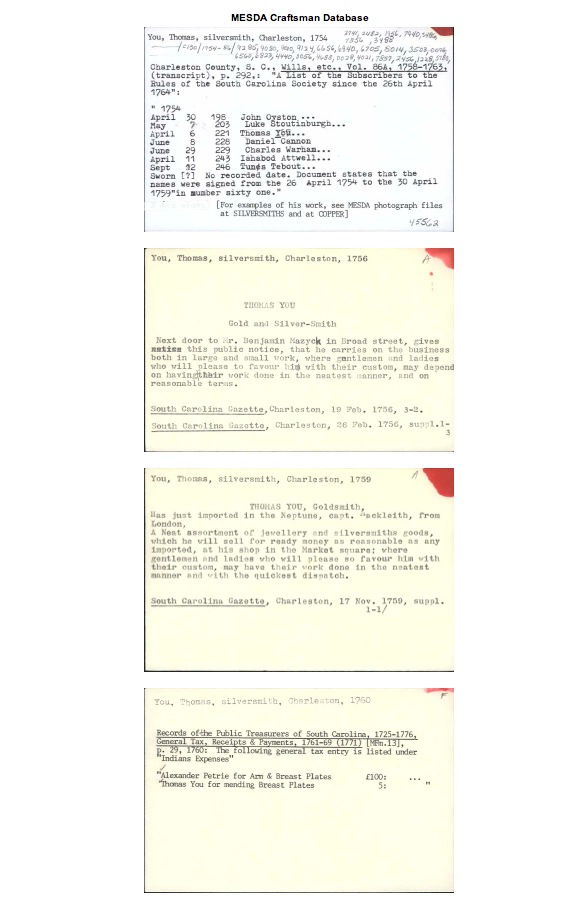MESDA Craftsman Database Help

Important: Be patient for search results to appear. Depending on your Internet connection, it can take upwards of a minute for some complex searches to complete.
Wachovia Area Craftsmen: Individuals who worked in the Wachovia Area of North Carolina have been documented in a separate database, the Old Salem Wachovia Residents Database. If your MESDA Craftsman Database results include Wachovia Area craftsmen, you should search for them in the Old Salem Wachovia Residents Database.
New Craftsman Records: As MESDA research associates identify new craftsmen or add new material concerning existing craftsmen, that information will appear in the Biblio Source field located below the card images. If a craftsman has been identified after MESDA switched to digital recording, then no card images will be present.
Broad to Narrow Search Terms: If your search yields no results, try a broader region or just a surname instead of a full name (i.e., Md. keyword search rather than Annapolis, Md. in the Geographic Location search field; or Shaw rather than John Shaw). Also, try a search with fewer parameters (i.e., Md. and Shaw rather than cabinetmaker and John Shaw and Annapolis, Md. and 1800).
Searches with Quotation Marks: Do not enclose search terms within quotation marks in any search field. Such a search will result in no returned records.
RACIAL TERMS AND HEADINGS
• There are racial terms used in the MESDA Craftsman Database that are now understood to be offensive, displaying insensitivity and ignorance. Such terms are in constant evolution and what is in common use at a particular time may be unacceptable at another point in time.
• Due to the historical nature of the Craftsman Database, direct quotes from the eighteenth and nineteenth century will often include words that are today considered inflammatory. Such words are used only as a direct quote from a period document.
PRINTING & SAVING RECORDS
• Use your internet browser’s “Print” function (usually found under the “File” menu item) to print pages. If you have a PDF creator or virtual printer installed on your computer you can “Print” to your search results to a PDF document.
• To save a record for viewing later during your session, right click on the image, select the “Save Image As” option, and select a location to save the .jpg on your computer.
KEYWORD SEARCH
• When you enter search terms in this field you will search all words in all the records in the database.
• To search for a phrase, do not enter the word inside quotes: corner cupboard, not “corner cupboard.”
• Keyword Search is best used when searching for terms that would not be included in one of the available search fields.
• Use Keyword Search to identify records from a broader geographic region than available in the Geographic Location pull-down menu. To search entire states, use the Keyword Search being sure to use tradition state abbreviations (i.e., Md., Va., N.C., S.C., Ga. Tenn. and Ky.).
SEARCH FIELDS
Craftsman Name:
• Names appear last name first. Names of apprentices are accompanied by the names of their masters (in capital letters) and “apprentice” will appear after the trade in the occupation field.
• If artisans have been found working in two or more locations, they are listed in each, with separate MESDA identification numbers. Caution must be used when identifying migrating craftsmen. When names appear twice, they may or may not represent the same person; to conclude that two listings of the same name do indeed refer to the same person in different regions is a judgment to be made by the researcher based on all the information available.
Trade:
The trades listed may contain several occupations that an individual artisan appears to have followed, based on the documented evidence examined. Normally, the trades artisans worked in are related in some way.
Geographic Location:
• Some artisans do not have a specified city or town and will be found by Keyword Searching the full name of the state (i.e., Maryland, North Carolina, or Alabama).
• If you are searching for artisans in a county that contains one or more towns or cities, you may need to search for multiple locations. For example, say you are searching for a craftsman in Fayette County, Kentucky, you will also need to search “Lexington, Ky.” Entering “Fayette Co., Ky.” will only result in those craftsman identified outside of Lexington.
• Use Keyword Search to identify records from a broader geographic region than available in the Geographic Location pull-down menu. To search entire states, use the Keyword Search being sure to use tradition state abbreviations (i.e., Md., Va., N.C., S.C., Ga. Tenn. and Ky.).
• If artisans have been found working in two or more locations, they are listed in each location, with separate MESDA identification numbers. Caution must be used when identifying migrating craftsmen. When names appear twice, they may or may not represent the same person; to conclude that two listings of the same name do indeed refer to the same person in different regions is a judgment to be made by the researcher based on all the information available.
• While primarily focused on MESDA’s early South (Maryland, Virginia, the Carolinas, Georgia, Kentucky, and Tennessee), some effort has been made to identify migrating craftsmen in cities and towns in New England and the Mid-Atlantic states. Primarily drawn from city directories, you will encounter records in the Craftsman Database for men and women working outside of the MESDA’s seven-state region.
• Individuals who worked in the Wachovia Area of North Carolina have been documented in a separate database, the Old Salem Wachovia Residents Database. If your MESDA Craftsman Database results include Wachovia Area craftsmen, you should search for them in the Old Salem Wachovia Residents Database.
Dates:
Use single year date only (1775). Results will include craftsmen that worked in that specific year and craftsmen that worked during a span of years that include that date (i.e., 1770–1790).
Summary Terms:
When more detailed information about a craftsman’s life or trade can be gleaned from the primary source, that data is included as a Summary term.
Status:
• When the gender, ethnicity, or enslaved/free status of a craftsman can be gleaned from the primary source, that data is included as a Status term. Note every record contains a status.
• The Status terms are:
| female artisan
indentured Black servant artisan American Indian artisan enslaved artisan |
free Black artisan
indentured servant artisan journeyman artisan |
MESDA ID Number:
• Every craftsman is assigned a unique ID number.
• If artisans have been found working in two or more locations, they are listed in each location, with separate MESDA identification numbers. Caution must be used when identifying migrating craftsmen. When names appear twice, they may or may not represent the same person; to conclude that two listings of the same name do indeed refer to the same person in different regions is a judgment to be made by the researcher based on all the information available.
CONTACT
If you have questions or want to request further information about our research holdings, please contact the MESDA Research Center at [email protected] or call 336-721-7379.
